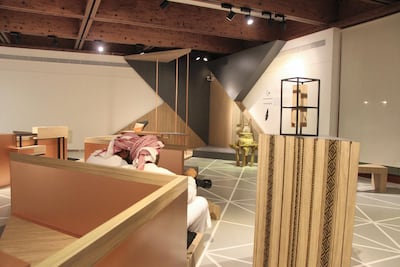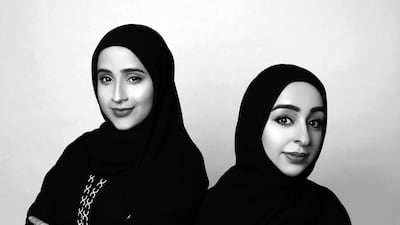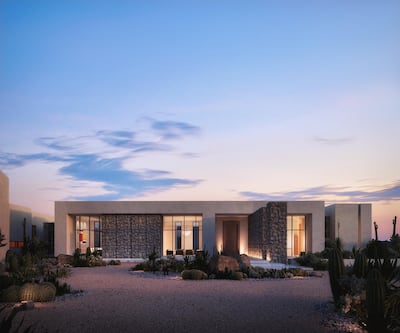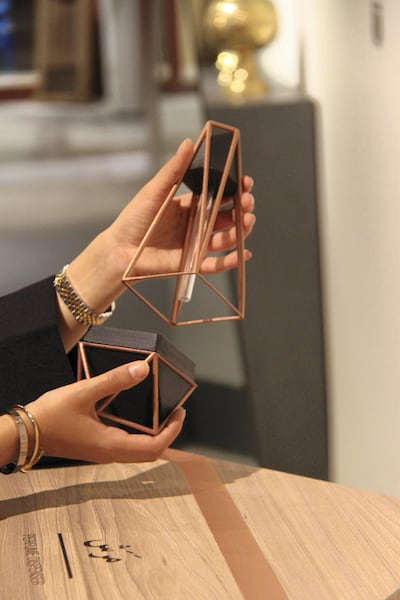Female Emirati architects are a rarity in the largely male-driven industry, and Noora Al Awar and Fatima Al Zaabi approach design differently to the men who have built the majority of the UAE's urban landscape. The founders of multidisciplinary firm Studio D04 pride themselves on marrying sensitive, regional lifestyle needs with modern architectural practices.
"We noticed early on that the region was made up of either commercial, contemporary design or old, traditional spaces, but there wasn't very much in between," says the softly spoken Al Awar. "We started to explore what contextual 'contemporary regional' architecture could look like. When you look back 50 years from now, what's going to be our tradition?"
Al Zaabi adds: "As Emiratis, we have a certain lifestyle. For example, the majlis is still an important space for our community and family gatherings, but it's often missing in the residential architecture that's offered today. There's little consideration to our day-to-day lives, like our concerns with privacy. When we design, it's not simply about how the space looks, but how we live in that space."
The duo, who are both 28 years old, met while studying architecture at the American University of Sharjah. Having worked on their final projects together, a seed was planted that culminated in the launch of the studio five years ago. With few regional female-owned architectural practices to look to for guidance and no template to follow, it's the women's sensitivity to their community's need that gives them the edge. Aside from Iraqi architect Zaha Hadid, who died in 2016, there isn't a huge library of mainstream examples guiding Al Awar and Al Zaabi's quest to form identities as female, Arab architects, while balancing traditional expectations. "People in this region aren't used to meeting women who are driving the project," says Al Awar.
"We get underestimated all the time," adds Al Zaabi. "Not only because we're female but because we're local, too. We really don't like playing the female card, or even the local card – we really want our work to speak for itself. Starting our own company was part of the narrative early on. It's a collaborative industry, so knowing that we worked well together was imperative."
Shortly after graduating in 2014, the women entered a competition as part of an Urban Commission for Design Days Dubai (now Downtown Design). The brief was to design an urban seating space and, based on their work, the Dubai Culture & Arts Authority asked the pair to design its booth at the then up-and-coming fair that year.

Both women are now fully involved in all aspects of Studio D04. The number in its name refers to the disciplines the firm offers: architecture, interior design, installations and product design. Commissions for each have been steadily rolling in, including showrooms and residential properties across the UAE.
Projects that show the duo's vision of a contemporary approach with an emphasis on traditional needs include the majlis at Al Qattara Arts Centre in Al Ain via Abu Dhabi Tourism, the medkhan (incense burner) displayed at Dubai's Al Shindagha Museum and a homeware collaboration with Iraqi designer Layth Mahdi, whom Al Zaabi met while doing her master's degree in architecture and digital technologies at the University of Michigan.
When Al Awar took a short break after giving birth to her first child, the Thari product line was born from Al Zaabi and Mahdi's shared interest in digital fabrication using computer code. Inspired by "thari", a term used to describe the wind that shapes sand dunes, the collection includes a vase, medkhan and table mirror, and was presented at Downtown Design last year.
The founders are also working on residential projects in Dubai and Ajman, transforming pre-built spaces from a cookie-cutter, one-design-suits-all starting point, and restructuring and modernising them with neoteric, Scandinavian-inspired finishes with an emphasis on local living. The blueprints reveal courtyards that can be used as community spaces (much like a majlis) and hidden spaces to which family members can retreat for privacy.
Studio D04 will also present a new decor collection at Downtown Design, which opens on Tuesday, November 12. As part of Irthi Council's Craft Dialogue programme, Al Zaabi worked with Italian designer Matteo Silverio to meld Italian glass with clay from the UAE to create a range of contemporary household objects, including a wireless iPhone charger, a lamp and a vase. "This collection is contemporary with a robotic background, but it's also rooted in traditional materials," Al Awar says.
The duo are also working on a version of Al Shindagha Museum's medkhan that will be mass-produced and more affordable, without compromising on quality. When deliberating on future design dreams, an art centre, museum and boutique hotel and spa are all mentioned.
The end game is clear: to continue to grapple with the tension between tradition and modernity, to evoke the domestic lives of the next generation of Arabs and, when viewed by future analysts, to be part of the narrative about life in the UAE here and now.



